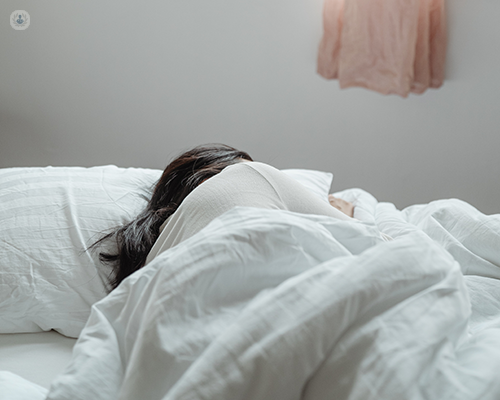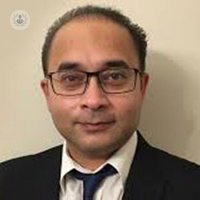How sleep disorders affect psychiatric conditions
Escrito por:Sleep disorders are a range of conditions that affect the ability, the quality, and the timing of sleep on a regular basis. Sleep is paramount for brain and body function; deprivation can thus severely affect mental and physical health as well as quality of life.
Here, Dr Raman Sakhuja, leading Consultant Psychiatrist, provides a comprehensive insight into sleep disorders. He explains how sleep disorders affect mental health and are associated with a number of psychiatric conditions, when medical attention should be sought for sleeping problems, and what people can do to improve their sleep at night, among other important points.

What are the different kinds of sleep disorders?
Sleep disorders are of various kinds, and I see many of those in my psychiatric practice. What I have noted is that, many times, people will describe difficulties in sleep, but the nature of their sleep disorders will not be investigated in more detail unless there is interest or knowledge about sleep disorders.
Different kinds of sleep disorders can be those related to circadian rhythm disorders, sleep related breathing disorders or sleep related movement disorders, to name a few. Many people suffer from restless legs syndrome, for example, which may not get picked up if a detailed enquiry about sleep is not done. It is only when sleep assessments and sleep studies are carried out that the various kinds of sleep disorders are detected and then appropriately treated.
How can sleep disorders affect psychiatric conditions?
The connection between sleep disorders and psychiatric conditions is crucial. If a timeline of the amount of sleep that people have been having over several years is made, it will tell us that the amount of sleep per night has reduced significantly over the years. Not having a good quality sleep can affect an individual’s general mental health, which may start off by just feeling fatigued or not paying attention to tasks, all the way to certain disorders, such as ADHD. If sleep is improved, some of the symptoms of these disorders will also improve.
Certain psychiatric disorders, such as depression, anxiety or psychotic conditions, also invariably have some form of a sleep disorder. In my experience, these conditions are typically brandished under the name of insomnia after a very preliminary patient enquiry.
Equally, many of the medications that are prescribed for mental health conditions can have a profound effect on sleep. This is because they can be influenced by alcohol, for example. Although drinking alcohol can cause people to fall asleep very quickly, the quality of their sleep is often very shallow and unrefreshed, and they may get up in the middle of the night.
Sleep disorders range from difficulties with fatigue or tiredness all the way to having sleep cycle pathologies. These can only be assessed and understood more carefully after carrying out a detailed sleep study. The approach from the best psychiatrists in Wales is to do detailed sleep assessments to be able to sift through the various disorders which present with psychiatric conditions and provide a more personalised plan of treatment.
Can sleep disorders improve on their own? When should people seek medical attention?
Sleep disorders by themselves do not improve on their own. In fact, many people who have sleep related difficulties are unaware of their sleep disorders and how these are affecting their mental health.
Take, for example, ADHD. Before starting treatment for ADHD, it is crucial to understand whether there is a sleeping difficulty also involved, because as high as 50 per cent of people with ADHD may have sleep related difficulties as well. Thus, if sleep is not treated or optimised properly, ADHD treatment may only be partially effective.
Sleep plays an important role in good mental health, especially for people who:
- Have difficulties going to sleep
- Have sleep maintenance problems
- Feel fatigued
- Have problems with concentration
Thus, getting assessed by a professional who knows about sleep disorders is essential.
How are sleep disorders managed? What does treatment involve?
From a psychiatric perspective, a comprehensive sleep assessment often involves the use of sleep-wake activity diaries (recording events in a diary) and the use of specific sleep questionnaires which start sifting through what kind of sleep disorders may be present.
One of the recognised methods I offer is Actigraphy, which utilises a medical device to monitor an individual’s cycle of activity and rest through the day and the night. It also includes temperature, light exposure and other parameters. This information can then help to identify the nature of the sleep disorder and its appropriate management.
For example, I once saw a patient for what was being queried as ADHD. When I started doing a sleep assessment, it became quite clear that this individual was suffering from obstructive sleep apnoea, a sleep related breathing disorder in which an individual’s breathing stops completely in the middle of the night for a few seconds before restarting and resuming. If an individual is having recurrent episodes of obstructive sleep apnoea (severity may vary depending on the type of obstruction) throughout the night, they will feel unrefreshed and fatigued in the morning. This will result in difficulties with concentration and attention that can be easily attributed to ADHD or that may worsen ADHD symptoms. Given that I do not treat obstructive sleep apnoea, in this instance, I recommended a referral to a respiratory and sleep specialist for appropriate treatment.
There are other disorders in my area of interest of neuropsychiatry and sleep where I can optimise their sleep component, whether this has to do with the circadian rhythm or another difficulty, such as restless legs syndrome. Treatment will depend on the sleep disorder or the condition detected through a sleep assessment - it is tailor-made to the individual.
What else can people do to sleep better at night?
Minor changes in people's routines throughout the day can go a long way.
Physical activity and exercise are needed throughout the day to tire the body out, almost acting like an impetus for the body to go into sleep mode. Nowadays, many people will also carry on using electronic devices late into the evening at night. The light emitted from these devices can influence the secretion of the melatonin hormone, which induces or helps natural sleep to occur. As a result, changing these lifestyle habits is very important. A small tip would be to change the spectrum of the light emitted from phone screens - changing the settings on the display to sunset to sunrise.
When it comes to eating at night, it is always helpful to allow at least a couple of hours to pass between eating a meal and going to bed.
Many people use their electronic devices right up until bedtime and then find that it takes them a long time to actually fall asleep. This use of electronic devices is not recommended. A bedtime routine that is more mindful - which includes turning down the lights, avoiding screen time, avoiding too much alcohol at night - can help to ease people into the evening and gradually start improving sleep.
The 24-hour cycle of sleep is anchored around an individual’s wake up time. Thus, having a regular wake up time and bedtime is very crucial. The more regularity, the better the deep sleep people will have, which is refreshing and of better quality.
These are some very old wisdoms, but it is useful to be reminded of them from time to time.
If you are concerned about a possible sleep disorder and wish to seek expert treatment, do not hesitate to visit Dr Sakhuja’s Top Doctors profile today.


